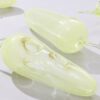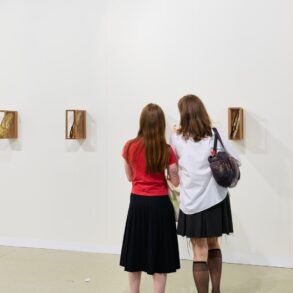
To mark this freedom of expression theme year, Global Cornell presents a three-part series profiling the challenges and successes of Cornell’s scholars under threat, written by Afghan journalist Fatima Faizi. When she fled Afghanistan in August 2021, Faizi was a correspondent for the New York Times and Al Jazeera. Today she is a student at Columbia University’s School of General Studies in New York City.
Before Afghan visual artist Sharifa “Elja” Sharifi fled her country in September 2021, a month after the Taliban seized control, she stashed dozens of her paintings in family members’ attics.
“My paintings are about women and their daily concerns,” she said – subject matter that defied the new regime’s stringent policies to suppress women’s presence in the public sphere.
As general manager of the Afghan National Gallery in Herāt – an employee of the toppled government – and a prominent voice for women rights, she knew the stakes went beyond preserving her art. Sharifi slipped out of the country with a friend’s family that had visas to travel to Iran.
Women’s official invisibility in Afghanistan worked in her favor. “I covered head-to-toe while I was leaving,” she said. “Fortunately the Taliban didn’t check the car and waved us through.”
While enrolled in a master’s program in Iran, Sharifi heard about an opportunity far from the turmoil at home. At Cornell’s Herbert F. Johnson Museum of Art, she found a new beginning. She is completing her second year as a visiting scholar at the museum, with support from Global Cornell, the Institute of International Education Artist Protection Fund, and the Open Society University Network’s Afghan Challenge Fund.
Sharifi’s art history research explores the historical, cultural and artistic significance of Persian pieces in the Johnson Museum’s renowned Asian art collection. Her work expands the museum’s approach to global art histories and highlights the rich artistic traditions of her homeland.
Working with Ellen Avril, the museum’s chief curator and Judith H. Stoikov Curator of Asian Art, Sharifi researched and curated The Poetic World of Persian Art, an exhibition of the museum’s Persian art collection that opened last September.
“Curating the exhibition was a link to my work at the National Gallery,” she said. “The museum’s Persian collection – which includes art from today’s Iran, Afghanistan and parts of Central Asia – connects me to my homeland.”
Sharifi and Avril are currently at work on a new exhibition of calligraphy by contemporary Afghan artist Hakim Karimzada, set to open in June. Sharifi says Avril and Johnson Museum director Jessica Levin Martinez have offered unwavering support during her time at the museum.
“I’ve learned a lot. It is an honor to work with them,” she said, “and I am very thankful.”
As a professional woman in Afghanistan and then Iran, Sharifi battled cultural norms and systems that place women at a disadvantage. In the United States, she faced challenges acclimating to a culture vastly different from her own. Her network of support at Cornell – including friends, colleagues and mentors – provided both practical assistance and emotional solidarity starting soon after her arrival.
“I was feeling I had fallen into a black hole after my country fell to the Taliban – losing my homeland and being separated from my family,” she said. “Sometimes I felt like I didn’t even have the strength to stand up. My colleagues helped me so much to regain my strength and get going.”
The local artistic community, she says, has given her a sanctuary for her creative expression and a platform to continue her work of amplifying Afghan women’s voices. One cause for celebration: Sharifi unveiled her own new artwork at her first U.S. exhibition last spring at State of the Art Gallery in Ithaca.
She said, “I have several goals for my art: to express women’s full humanity and break taboos; to show women’s desires, including their hopes and dreams for freedom; and political and social criticism to protest the invisibility of Afghan women.”
Today Sharifi is looking forward to more learning, more time to create and a hopeful path forward with the community she’s found on campus.
She was recently accepted into Cornell’s PhD program in the history of art, archaeology and visual studies with full funding guaranteed. Her scholarly work is poised to explore the intersections of gender, culture and politics, shedding light on systemic barriers and advocating for women’s empowerment and gender equity in Afghanistan and worldwide.
As Sharifi begins her new chapter, the situation for women in Afghanistan remains deeply troubling. Women and girls have been barred from schools and universities, public positions and most employment outside the home – including urgently needed healthcare and humanitarian work.
Sharifi reflects on her PhD plans with a perspective that transcends academic achievement. She says she feels a profound sense of duty and responsibility to the women of Afghanistan. She sees her escape not as a personal achievement, but as a call to action: to use her voice, skills and platform to effect change and bring attention to the plight of women under the Taliban’s rule.
“Those of us who have left,” she said, “must become the voice of women who are living under the Taliban.”
Fatima Faizi is a freelance writer for Global Cornell. Read the previous Defying the Odds stories on Turkish sociologist Azat Gündoğan and Nicaraguan cartoonist Pedro X. Molina.
This post was originally published on this site be sure to check out more of their content







